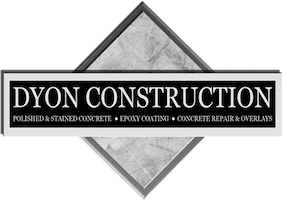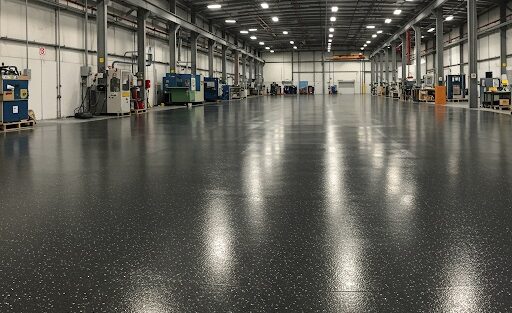Industrial environments demand durability, safety, and cost-effective flooring solutions that can withstand extreme conditions, heavy machinery, and high foot traffic. Industrial epoxy flooring is the gold standard for businesses looking for long-lasting, chemical-resistant, and easy-to-maintain flooring.
Whether you’re running a warehouse, manufacturing plant, clean room, industrial kitchen, or data center, epoxy flooring offers unmatched protection and customization. But how do you choose the right epoxy flooring system? What are the costs involved, and why is hiring an expert contractor crucial?
This guide will cover everything you need to know about industrial epoxy flooring, including types, benefits, pricing, installation, and maintenance.
What Is Industrial Epoxy Flooring?
Industrial epoxy flooring is a high-performance resin coating designed to protect concrete floors from chemical exposure, heavy machinery, and daily wear and tear. It consists of multiple layers of epoxy resin that bond to the concrete substrate, creating a seamless, ultra-durable, and stain-resistant surface.
Why Is Epoxy Ideal for Industrial Flooring?
Industrial spaces are exposed to harsh conditions that can degrade ordinary flooring materials. Epoxy flooring provides:
✅ Superior Durability – Withstands heavy loads, forklifts, and high foot traffic.
✅ Chemical & Stain Resistance – Ideal for factories, warehouses, and food processing plants.
✅ Seamless & Hygienic – No cracks or grout lines where bacteria and contaminants can accumulate.
✅ Slip-Resistant Additives Available – Improves safety in wet or hazardous areas.
✅ Fast Installation & Cure Time – Minimizes downtime for businesses.
✅ Customizable Finishes – Available in various colors, textures, and thicknesses to meet industry standards.
Comparison of Industrial Epoxy Flooring Systems
Each industrial setting requires a specific epoxy flooring system depending on safety requirements, durability needs, and environmental factors. Below is a detailed comparison of the most commonly used industrial epoxy flooring types.
Epoxy Flooring Type | Pros | Cons | Best For | Price Range (per sq. ft.) | Durability | Maintenance |
Standard Industrial Epoxy | Affordable, chemical & stain-resistant | Can be slippery when wet | Warehouses, manufacturing plants | $3–$7 | 5–10 years | Low |
Self-Leveling Epoxy | Smooth, even surface, high durability | Higher cost | Pharmaceutical & clean rooms | $4–$8 | 8–15 years | Low |
Epoxy Flake Flooring | Slip-resistant, hides imperfections | More textured surface | Industrial kitchens, workshops | $5–$10 | 7–12 years | Low |
Quartz Epoxy Flooring | Extra durable, enhanced traction | Higher cost | High-traffic factories, labs | $6–$12 | 10+ years | Low |
Electrostatic Dissipative (ESD) Epoxy | Prevents static buildup, protects equipment | Requires specialized installation | Electronics & data centers | $8–$15 | 10+ years | Low |
Types of Industrial Epoxy Flooring & Their Applications
1. Standard Industrial Epoxy Flooring
- Best For: Warehouses, distribution centers, storage facilities
- Pros: Affordable, strong chemical resistance, easy maintenance
- Cons: Can be slippery without anti-slip additives
Why Choose It?
This is the most cost-effective epoxy system for general industrial settings. It provides a durable, stain-resistant finish that protects concrete floors from wear and tear.
2. Self-Leveling Epoxy Flooring
- Best For: Pharmaceutical plants, laboratories, clean rooms
- Pros: Creates a perfectly smooth, even surface; resists heavy loads
- Cons: Higher cost than standard epoxy
Why Choose It?
Self-leveling epoxy is ideal for environments requiring a contaminant-free, dust-proof floor. It’s frequently used in medical and food processing facilities where hygiene is a top priority.
3. Epoxy Flake Flooring
- Best For: Industrial kitchens, breweries, manufacturing plants
- Pros: Slip-resistant, hides cracks and imperfections
- Cons: More textured surface than smooth epoxy
Why Choose It?
The flake system enhances traction while providing an aesthetic, decorative finish. It’s a great choice for food preparation areas and other spaces that need high durability and visual appeal.
4. Quartz Epoxy Flooring
- Best For: High-traffic facilities, production plants, hospitals
- Pros: Extreme durability, superior traction
- Cons: Higher cost due to premium materials
Why Choose It?
Quartz-infused epoxy flooring is designed for high-impact areas that require abrasion resistance, strength, and traction.
5. Electrostatic Dissipative (ESD) Epoxy Flooring
- Best For: Electronics manufacturing, data centers, semiconductor plants
- Pros: Prevents static buildup, protects sensitive equipment
- Cons: Requires specialized installation
Why Choose It?
In static-sensitive environments, ESD epoxy flooring prevents electrostatic discharge, reducing the risk of damage to expensive electronics.
How Much Does Industrial Epoxy Flooring Cost?
Factors Affecting Pricing:
- Size of the Area – Larger areas typically have lower per-square-foot costs.
- Epoxy Type – Standard epoxy is the most affordable, while quartz and ESD epoxy cost more.
- Surface Preparation – Grinding, crack repairs, and cleaning add to the total cost.
- Customization – Adding logos, anti-slip textures, or multiple color blends increases expenses.
Industrial Space Size | Estimated Cost (Standard Epoxy) | Estimated Cost (High-Performance Epoxy) |
5,000 sq. ft. | $15,000 – $35,000 | $30,000 – $75,000 |
10,000 sq. ft. | $30,000 – $70,000 | $60,000 – $150,000 |
50,000+ sq. ft. | $150,000+ | $300,000+ |
Hiring an Industrial Epoxy Flooring Contractor
Why Work with a Professional Epoxy Contractor?
✅ Expert Surface Preparation – Ensures proper bonding to avoid peeling or bubbling.
✅ Specialized Installation Equipment – Industrial epoxy requires precision tools and techniques.
✅ Long-Lasting Results – A professional installation lasts twice as long as a DIY application.
✅ Compliance with Industry Standards – Ensures OSHA, FDA, and USDA compliance for specialized environments.
Questions to Ask Before Hiring an Epoxy Flooring Contractor:
- Do you have experience with industrial epoxy flooring?
- Can you provide references or case studies from past projects?
- What warranty do you offer on materials and installation?
- How long will the installation take, and what is the downtime?
- Do you provide slip-resistant coatings and customization options?
Frequently Asked Questions
How much does industrial epoxy flooring cost?
Costs range from $3 to $15 per square foot, depending on epoxy type, surface preparation, and customizations.
How long does industrial epoxy flooring last?
With proper maintenance, industrial epoxy flooring lasts 10+ years, even in high-traffic environments.
Is epoxy flooring cheaper than other industrial flooring options?
Yes! Epoxy is more cost-effective than tile, polished concrete, and vinyl, offering superior durability and chemical resistance.
Industrial epoxy flooring is the ultimate solution for warehouses, factories, clean rooms, and production facilities looking for long-term performance and minimal maintenance. Whether you need anti-slip coatings, chemical resistance, or static control, hiring a professional epoxy contractor ensures flawless installation and maximum durability.
If you’re ready to upgrade your industrial space, invest in high-performance epoxy flooring that meets your operational needs and industry standards.

